UST
-
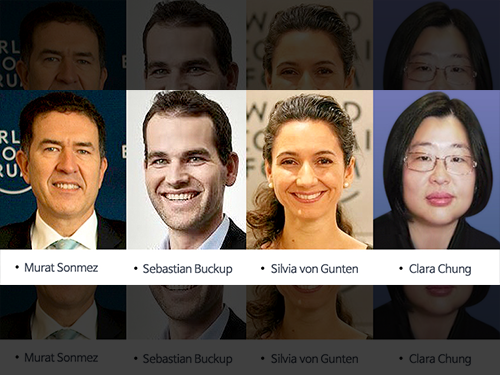 KAIST-WEF Roundtable on Inclusive Growth and Job Creation
The World Economic Forum (WEF) will join KAIST in an effort to address sweeping global problems in the wake of the Fourth Industrial Revolution. The two will co-host a roundtable on ‘Shaping Korea’s Priorities for Inclusive Growth and Job Creation in the Fourth Industrial Revolution’ on October 13 at Lotte Hotel in Seoul.
The roundtable will bring together leaders from government, industry, universities, and non-profit civic organizations to have an in-depth discussion on a thought-provoking agenda of inclusive growth and job creation which scientific and technological changes will bring about. The event will provide a platform to explore practical collaboration and innovative strategies for better job creation and innovation ecosystems.
The two will also sign an MOU for collaboration between the Fourth Industrial Revolution Information Center (FIRIC) of KAIST and the WEF Center for the Fourth Industrial Revolution (C4IR).
President Sung-Chul Shin of KAIST and the Head of the WEF Center for the Fourth Industrial Revolution, Murat Sonmez, will lead the panel discussion titled ‘Inclusive Growth and the Fourth Industrial Revolution’ which will be attended by leaders from government, industry, and non-profit civic organizations.
At the breakout sessions, the topics will be “Future Jobs” and the “Creation of Innovation Ecosystems”. Additionally, a discussion on the “SME 4.0 Initiative”, which is a program pushed forward by KAIST in collaboration with local governments, will talk about job creation through innovation in small and medium-sized enterprises (SMEs). The WEF will introduce their two-year activities and research on the Fourth Industrial Revolution, which have great potential and a high possibility of successfully undergoing the revolution, to Korea.
Since WEF Executive Chairman Klaus Schwab brought up the topic of the Fourth Industrial Revolution, the WEF has been leading agenda topics and discussions on high-profile matters, including ‘technology-driven but human-centered inclusive growth’ in predicting the future of jobs.
The WEF is a nonprofit organization committed to addressing the world’s weightiest problems. It is best known for its annual meetings in Davos, Switzerland, which attracts leaders from around the world. KAIST has been participating in this summit since 2009. President Shin will also attend the upcoming Davos summit next January. Distinguished Professor Sang Yup Lee who heads the KAIST Institute and the FIRIC is the co-chair of the Global Council on Biotechnology and a member of the Global Future Council on the Fourth Industrial Revolution at the WEF.
Moreover, President Shin and Mr. Sonmez will explain the background of the roundtable and share the results of the sessions at a joint news conference.
2017.09.28 View 11251
KAIST-WEF Roundtable on Inclusive Growth and Job Creation
The World Economic Forum (WEF) will join KAIST in an effort to address sweeping global problems in the wake of the Fourth Industrial Revolution. The two will co-host a roundtable on ‘Shaping Korea’s Priorities for Inclusive Growth and Job Creation in the Fourth Industrial Revolution’ on October 13 at Lotte Hotel in Seoul.
The roundtable will bring together leaders from government, industry, universities, and non-profit civic organizations to have an in-depth discussion on a thought-provoking agenda of inclusive growth and job creation which scientific and technological changes will bring about. The event will provide a platform to explore practical collaboration and innovative strategies for better job creation and innovation ecosystems.
The two will also sign an MOU for collaboration between the Fourth Industrial Revolution Information Center (FIRIC) of KAIST and the WEF Center for the Fourth Industrial Revolution (C4IR).
President Sung-Chul Shin of KAIST and the Head of the WEF Center for the Fourth Industrial Revolution, Murat Sonmez, will lead the panel discussion titled ‘Inclusive Growth and the Fourth Industrial Revolution’ which will be attended by leaders from government, industry, and non-profit civic organizations.
At the breakout sessions, the topics will be “Future Jobs” and the “Creation of Innovation Ecosystems”. Additionally, a discussion on the “SME 4.0 Initiative”, which is a program pushed forward by KAIST in collaboration with local governments, will talk about job creation through innovation in small and medium-sized enterprises (SMEs). The WEF will introduce their two-year activities and research on the Fourth Industrial Revolution, which have great potential and a high possibility of successfully undergoing the revolution, to Korea.
Since WEF Executive Chairman Klaus Schwab brought up the topic of the Fourth Industrial Revolution, the WEF has been leading agenda topics and discussions on high-profile matters, including ‘technology-driven but human-centered inclusive growth’ in predicting the future of jobs.
The WEF is a nonprofit organization committed to addressing the world’s weightiest problems. It is best known for its annual meetings in Davos, Switzerland, which attracts leaders from around the world. KAIST has been participating in this summit since 2009. President Shin will also attend the upcoming Davos summit next January. Distinguished Professor Sang Yup Lee who heads the KAIST Institute and the FIRIC is the co-chair of the Global Council on Biotechnology and a member of the Global Future Council on the Fourth Industrial Revolution at the WEF.
Moreover, President Shin and Mr. Sonmez will explain the background of the roundtable and share the results of the sessions at a joint news conference.
2017.09.28 View 11251 -
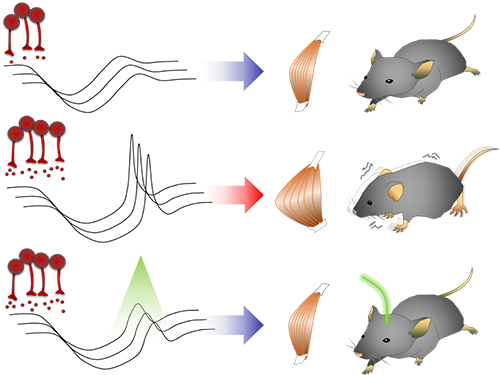 Unlocking the Keys to Parkinson's Disease
A KAIST research team has identified a new mechanism that causes the hallmark symptoms of Parkinson’s disease, namely tremors, rigidity, and loss of voluntary movement.
The discovery, made in collaboration with Nanyang Technological University in Singapore, presents a new perspective to three decades of conventional wisdom in Parkinson’s disease research. It also opens up new avenues that can help alleviate the motor problems suffered by patients of the disease, which reportedly number more than 10 million worldwide. The research was published in Neuron on August 30.
The research team was led by Professor Daesoo Kim from the Department of Biological Sciences at KAIST and Professor George Augustine from the Lee Kong Chian School of Medicine at NTU. Dr. Jeongjin Kim, a former postdoctoral fellow at KAIST who now works at the Korea Institute of Science and Technology (KIST), is the lead author.
It is known that Parkinson’s disease is caused by a lack of dopamine, a chemical in the brain that transmits neural signals. However, it remains unknown how the disease causes the motor
Smooth, voluntary movements, such as reaching for a cup of coffee, are controlled by the basal ganglia, which issue instructions via neurons (nerve cells that process and transmit information in the brain) in the thalamus to the cortex. These instructions come in two types: one that triggers a response (excitatory signals) and the other that suppresses a response (inhibitory signals). Proper balance between the two controls movement.
A low level of dopamine causes the basal ganglia to severely inhibit target neurons in the thalamus, called an inhibition. Scientists have long assumed that this stronger inhibition causes the motor problems of Parkinson’s disease patients.
To test this assumption, the research team used optogenetic technology in an animal model to study the effects of this increased inhibition of the thalamus and ultimately movement. Optogenetics is the use of light to control the activity of specific types of neurons within the brain.
They found that when signals from the basal ganglia are more strongly activated by light, the target neurons in the thalamus paradoxically became hyperactive. Called rebound excitation, this hyperactivity produced abnormal muscular stiffness and tremor. Such motor problems are very similar to the symptoms of Parkinson’s disease patients. When this hyperactivity of thalamic neurons is suppressed by light, mice show normal movments without Parkinson’s disease symptoms. Reducing the levels of activity back to normal caused the motor symptoms to stop, proving that the hyperactivity caused the motor problems experienced by Parkinson’s disease patients.
Professor Kim at KAIST said, “This study overturns three decades of consensus on the provenance of Parkinsonian symptoms.” The lead author, Dr Jeongjin Kim said, “The therapeutic implications of this study for the treatment of Parkinsonian symptoms are profound. It may soon become possible to remedy movement disorders without using L-DOPA, a pre-cursor to dopamine.”
Professor Augustine at NTU added, “Our findings are a breakthrough, both for understanding how the brain normally controls the movement of our body and how this control goes awry during Parkinson’s disease and related dopamine-deficiency disorders.”
The study took five years to complete, and includes researchers from the Department of Bio & Brain Engineering at KAIST.
The research team will move forward by investigating how hyperactivity in neurons in the thalamus leads to abnormal movement, as well as developing therapeutic strategies for the disease by targeting this neural mechanism.
Figure abstract: Inhibitory inputs from the basal ganglia inhibit thalamic neurons (upper). In low-dopamine states, like PD, rebound firing follows inhibition and causes movement disorders (middle). The inhibition of rebound firing alleviates PD-like symptoms in a mouse model of PD.
2017.09.22 View 11297
Unlocking the Keys to Parkinson's Disease
A KAIST research team has identified a new mechanism that causes the hallmark symptoms of Parkinson’s disease, namely tremors, rigidity, and loss of voluntary movement.
The discovery, made in collaboration with Nanyang Technological University in Singapore, presents a new perspective to three decades of conventional wisdom in Parkinson’s disease research. It also opens up new avenues that can help alleviate the motor problems suffered by patients of the disease, which reportedly number more than 10 million worldwide. The research was published in Neuron on August 30.
The research team was led by Professor Daesoo Kim from the Department of Biological Sciences at KAIST and Professor George Augustine from the Lee Kong Chian School of Medicine at NTU. Dr. Jeongjin Kim, a former postdoctoral fellow at KAIST who now works at the Korea Institute of Science and Technology (KIST), is the lead author.
It is known that Parkinson’s disease is caused by a lack of dopamine, a chemical in the brain that transmits neural signals. However, it remains unknown how the disease causes the motor
Smooth, voluntary movements, such as reaching for a cup of coffee, are controlled by the basal ganglia, which issue instructions via neurons (nerve cells that process and transmit information in the brain) in the thalamus to the cortex. These instructions come in two types: one that triggers a response (excitatory signals) and the other that suppresses a response (inhibitory signals). Proper balance between the two controls movement.
A low level of dopamine causes the basal ganglia to severely inhibit target neurons in the thalamus, called an inhibition. Scientists have long assumed that this stronger inhibition causes the motor problems of Parkinson’s disease patients.
To test this assumption, the research team used optogenetic technology in an animal model to study the effects of this increased inhibition of the thalamus and ultimately movement. Optogenetics is the use of light to control the activity of specific types of neurons within the brain.
They found that when signals from the basal ganglia are more strongly activated by light, the target neurons in the thalamus paradoxically became hyperactive. Called rebound excitation, this hyperactivity produced abnormal muscular stiffness and tremor. Such motor problems are very similar to the symptoms of Parkinson’s disease patients. When this hyperactivity of thalamic neurons is suppressed by light, mice show normal movments without Parkinson’s disease symptoms. Reducing the levels of activity back to normal caused the motor symptoms to stop, proving that the hyperactivity caused the motor problems experienced by Parkinson’s disease patients.
Professor Kim at KAIST said, “This study overturns three decades of consensus on the provenance of Parkinsonian symptoms.” The lead author, Dr Jeongjin Kim said, “The therapeutic implications of this study for the treatment of Parkinsonian symptoms are profound. It may soon become possible to remedy movement disorders without using L-DOPA, a pre-cursor to dopamine.”
Professor Augustine at NTU added, “Our findings are a breakthrough, both for understanding how the brain normally controls the movement of our body and how this control goes awry during Parkinson’s disease and related dopamine-deficiency disorders.”
The study took five years to complete, and includes researchers from the Department of Bio & Brain Engineering at KAIST.
The research team will move forward by investigating how hyperactivity in neurons in the thalamus leads to abnormal movement, as well as developing therapeutic strategies for the disease by targeting this neural mechanism.
Figure abstract: Inhibitory inputs from the basal ganglia inhibit thalamic neurons (upper). In low-dopamine states, like PD, rebound firing follows inhibition and causes movement disorders (middle). The inhibition of rebound firing alleviates PD-like symptoms in a mouse model of PD.
2017.09.22 View 11297 -
 Humicotta Wins the Silver Prize at the 2017 IDEA
The 3D-printed ceramic humidifier made by the research team led by Professor Sang-Min Bae won the silver prize at the 2017 International Design Excellence Awards (IDEA). Professor Bae’s ID+IM team was also listed as winners of three more appropriate technology designs at the IDEA. The awards, sponsored by the Industrial Designers Society of America, are one of the three prestigious design awards including the Red Dot Design Award and the iF Design Award in Germany.
The silver prize winner in the category of home and bath, Humicotta is an energy-efficient, bacteria free, and easy to clean humidifier. It includes a base module and filter. The base is a cylindrical pedestal with a built-in fan on which the filter is placed. The filter is a 3D-printed honeycomb structure made of diatomite. When water is added, the honeycomb structure and porous terracotta maximize natural humidification. It also offers an open platform service that customizes the filters or provides files that users can use their own 3D printer.
Professor Bae’s team has worked on philanthropy design using appropriate technology as their main topic for years. Their designs have been recognized at prestigious global design awards events, winning more than 50 prizes with innovative designs made for addressing various global and social problems.
The Light Funnel is a novel type of lighting device designed for off-grid areas of Africa. It helps to maximize the natural light effect in the daytime without any drastic home renovations. It consists of a transparent acrylic sphere and a reflective pathway. After filling the acrylic sphere with water and placing it on a rooftop, sunlight passes into the house through the water inside the sphere. It provides a lighted environment nine times brighter than without it. Also, once installed, it can be used almost permanently.
The Maasai Smart Cane is made using wood sticks purchased through fair trade with the Maasai tribe. GPS is installed into the grip of the birch-tree cane, so that cane users can send a signal when in an emergency situation. All of the proceeds of this product go to the tribe.
S.Cone is a first aid kit made in collaboration with Samsung Fire and Marine Insurance. The traffic cone-shaped kit is designed to help users handle an emergency situation intact and safe. The S.Cone has unique versions for fires, car accidents, and marine accidents. For example, the S.Cone for fires is equipped with a small fire extinguisher, smoke mask, and fire blanket. The cap of the S.Cone also functions as an IoT station connecting the fire and gas detector with smart phones.
Professor Bae said of his team’s winning design products, “By making the data public, any person can design their own humidifier if they have access to a 3D-printer. We want it to be a very accessible product for the public. The Light Funnel and Maasai Smart Cane are designed for economically-marginalized populations and the elderly. We will continue to make the best designed products serving the marginalized 90% of the population around the world.”
2017.09.14 View 28623
Humicotta Wins the Silver Prize at the 2017 IDEA
The 3D-printed ceramic humidifier made by the research team led by Professor Sang-Min Bae won the silver prize at the 2017 International Design Excellence Awards (IDEA). Professor Bae’s ID+IM team was also listed as winners of three more appropriate technology designs at the IDEA. The awards, sponsored by the Industrial Designers Society of America, are one of the three prestigious design awards including the Red Dot Design Award and the iF Design Award in Germany.
The silver prize winner in the category of home and bath, Humicotta is an energy-efficient, bacteria free, and easy to clean humidifier. It includes a base module and filter. The base is a cylindrical pedestal with a built-in fan on which the filter is placed. The filter is a 3D-printed honeycomb structure made of diatomite. When water is added, the honeycomb structure and porous terracotta maximize natural humidification. It also offers an open platform service that customizes the filters or provides files that users can use their own 3D printer.
Professor Bae’s team has worked on philanthropy design using appropriate technology as their main topic for years. Their designs have been recognized at prestigious global design awards events, winning more than 50 prizes with innovative designs made for addressing various global and social problems.
The Light Funnel is a novel type of lighting device designed for off-grid areas of Africa. It helps to maximize the natural light effect in the daytime without any drastic home renovations. It consists of a transparent acrylic sphere and a reflective pathway. After filling the acrylic sphere with water and placing it on a rooftop, sunlight passes into the house through the water inside the sphere. It provides a lighted environment nine times brighter than without it. Also, once installed, it can be used almost permanently.
The Maasai Smart Cane is made using wood sticks purchased through fair trade with the Maasai tribe. GPS is installed into the grip of the birch-tree cane, so that cane users can send a signal when in an emergency situation. All of the proceeds of this product go to the tribe.
S.Cone is a first aid kit made in collaboration with Samsung Fire and Marine Insurance. The traffic cone-shaped kit is designed to help users handle an emergency situation intact and safe. The S.Cone has unique versions for fires, car accidents, and marine accidents. For example, the S.Cone for fires is equipped with a small fire extinguisher, smoke mask, and fire blanket. The cap of the S.Cone also functions as an IoT station connecting the fire and gas detector with smart phones.
Professor Bae said of his team’s winning design products, “By making the data public, any person can design their own humidifier if they have access to a 3D-printer. We want it to be a very accessible product for the public. The Light Funnel and Maasai Smart Cane are designed for economically-marginalized populations and the elderly. We will continue to make the best designed products serving the marginalized 90% of the population around the world.”
2017.09.14 View 28623 -
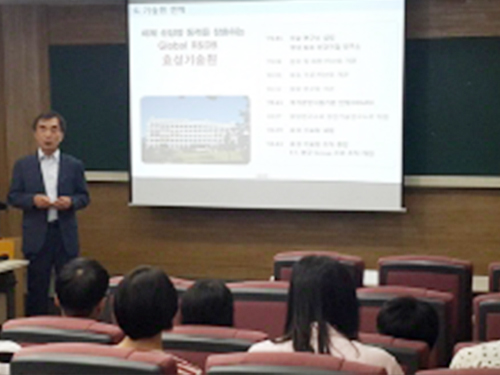 Hyosung R&DB Labs to Teach Special Class on High Molecule Chemistry for the Fall Semester
The Department of Chemistry in collaboration with the Hyosung Group’s R&DB Labs will open a ‘special class on high molecule chemistry’ for Masters and Ph.D. candidates. The class, led by researchers at Hyosung’s R&D think tank, will provide the latest market and technology trends in the molecule chemical industry during the fall semester.
Hyosung joined this special industry program in an effort to enhance students’ hands-on understanding of new technologies that will emerge in the global market. During the semester, Hyosung plans to present the technology portfolios on their brand new materials of TAC film, membrane, and carbon fiber as well as the existing products leading the world in market share such as spandex, tire cords.
Hyosung plans to recruit students who previously took courses led by Hyosung researchers. President Tu-Won Chang of Hyosung R&DB said, “This program is designed to foster highly qualified R&D personnel especially catering to our company’s needs and market demands. We will continue to share our company’s market analysis and R&D know-how with outstanding universities.
2017.09.07 View 5841
Hyosung R&DB Labs to Teach Special Class on High Molecule Chemistry for the Fall Semester
The Department of Chemistry in collaboration with the Hyosung Group’s R&DB Labs will open a ‘special class on high molecule chemistry’ for Masters and Ph.D. candidates. The class, led by researchers at Hyosung’s R&D think tank, will provide the latest market and technology trends in the molecule chemical industry during the fall semester.
Hyosung joined this special industry program in an effort to enhance students’ hands-on understanding of new technologies that will emerge in the global market. During the semester, Hyosung plans to present the technology portfolios on their brand new materials of TAC film, membrane, and carbon fiber as well as the existing products leading the world in market share such as spandex, tire cords.
Hyosung plans to recruit students who previously took courses led by Hyosung researchers. President Tu-Won Chang of Hyosung R&DB said, “This program is designed to foster highly qualified R&D personnel especially catering to our company’s needs and market demands. We will continue to share our company’s market analysis and R&D know-how with outstanding universities.
2017.09.07 View 5841 -
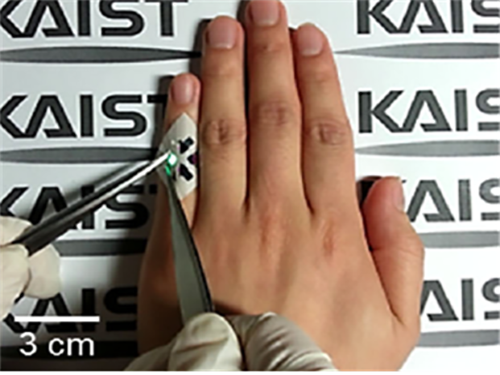 The Medici Effect: Highly Flexible, Wearable Displays Born in KAIST
(Ph.D. candidate Seungyeop Choi)
How do you feel when technology you saw in a movie is made into reality? Collaboration between the electrical engineering and textile industries has made TVs or smartphone screens displaying on clothing a reality.
A research team led by Professor Kyung Cheol Choi at the School of Electrical Engineering presented wearable displays for various applications including fashion, IT, and healthcare. Integrating OLED (organic light-emitting diode) into fabrics, the team developed the most highly flexible and reliable technology for wearable displays in the world.
Recently, information displays have become increasingly important as they construct the external part of smart devices for the next generation. As world trends are focusing on the Internet of Things (IoTs) and wearable technology, the team drew a lot of attention by making great progress towards commercializing clothing-shaped ‘wearable displays’.
The research for realizing displays on clothing gained considerable attention from academia as well as industry when research on luminescence formed in fabrics was introduced in 2011; however, there was no technology for commercializing it due to its surface roughness and flexibility.
Because of this technical limitation, clothing-shaped wearable displays were thought to be unreachable technology. However, the KAIST team recently succeeded in developing the world’s most highly efficient, light-emitting clothes that can be commercialized.
The research team used two different approaches, fabric-type and fiber-type, in order to realize clothing-shaped wearable displays. In 2015, the team successfully laminated a thin planarization sheet thermally onto fabric to form a surface that is compatible with the OLEDs approximately 200 hundred nanometers thick. Also, the team reported their research outcomes on enhancing the reliability of operating fiber-based OLEDs. In 2016, the team introduced a dip-coating method, capable of uniformly depositing layers, to develop polymer light-emitting diodes, which show high luminance even on thin fabric.
Based on the research performance in 2015 and 2016, Ph.D. candidate Seungyeop Choi took the lead in the research team and succeeded in realizing fabric-based OLEDs, showing high luminance and efficiency while maintaining the flexibility of the fabric.
The long-term reliability of this wearable device that has the world’s best electrical and optical characteristics was verified through their self-developed, organic and inorganic encapsulation technology. According to the team, their wearable device facilitates the operation of OLEDs even at a bending radius of 2mm.
According to Choi, “Having wavy structures and empty spaces, fiber plays a significant role in lowering the mechanical stress on the OLEDs.”
“Screen displayed on our daily clothing is no longer a future technology,” said Professor Choi. “Light-emitting clothes will have considerable influence on not only the e-textile industry but also the automobile and healthcare industries.”
Moreover, the research team remarked, “It means a lot to realize clothing-shaped OLEDs that have the world’s best luminance and efficiency. It is the most flexible fabric-based light-emitting device among those reported. Moreover, noting that this research carried out an in-depth analysis of the mechanical characteristics of the clothing-spared, light-emitting device, the research performance will become a guideline for developing the fabric-based electronics industry.”
This research was funded by the Ministry of Trade, Industry and Energy and collaborated with KOLON Glotech, INC. The research performance was published in Scientific Reports in July.
(OLEDs operating in fabrics)
(Current-voltage-luminance and efficiency of the highly flexible, fabric-based OLEDs;Image of OLEDs after repetitive bending tests;Verification of flexibility through mechanical simulation)
2017.08.24 View 16493
The Medici Effect: Highly Flexible, Wearable Displays Born in KAIST
(Ph.D. candidate Seungyeop Choi)
How do you feel when technology you saw in a movie is made into reality? Collaboration between the electrical engineering and textile industries has made TVs or smartphone screens displaying on clothing a reality.
A research team led by Professor Kyung Cheol Choi at the School of Electrical Engineering presented wearable displays for various applications including fashion, IT, and healthcare. Integrating OLED (organic light-emitting diode) into fabrics, the team developed the most highly flexible and reliable technology for wearable displays in the world.
Recently, information displays have become increasingly important as they construct the external part of smart devices for the next generation. As world trends are focusing on the Internet of Things (IoTs) and wearable technology, the team drew a lot of attention by making great progress towards commercializing clothing-shaped ‘wearable displays’.
The research for realizing displays on clothing gained considerable attention from academia as well as industry when research on luminescence formed in fabrics was introduced in 2011; however, there was no technology for commercializing it due to its surface roughness and flexibility.
Because of this technical limitation, clothing-shaped wearable displays were thought to be unreachable technology. However, the KAIST team recently succeeded in developing the world’s most highly efficient, light-emitting clothes that can be commercialized.
The research team used two different approaches, fabric-type and fiber-type, in order to realize clothing-shaped wearable displays. In 2015, the team successfully laminated a thin planarization sheet thermally onto fabric to form a surface that is compatible with the OLEDs approximately 200 hundred nanometers thick. Also, the team reported their research outcomes on enhancing the reliability of operating fiber-based OLEDs. In 2016, the team introduced a dip-coating method, capable of uniformly depositing layers, to develop polymer light-emitting diodes, which show high luminance even on thin fabric.
Based on the research performance in 2015 and 2016, Ph.D. candidate Seungyeop Choi took the lead in the research team and succeeded in realizing fabric-based OLEDs, showing high luminance and efficiency while maintaining the flexibility of the fabric.
The long-term reliability of this wearable device that has the world’s best electrical and optical characteristics was verified through their self-developed, organic and inorganic encapsulation technology. According to the team, their wearable device facilitates the operation of OLEDs even at a bending radius of 2mm.
According to Choi, “Having wavy structures and empty spaces, fiber plays a significant role in lowering the mechanical stress on the OLEDs.”
“Screen displayed on our daily clothing is no longer a future technology,” said Professor Choi. “Light-emitting clothes will have considerable influence on not only the e-textile industry but also the automobile and healthcare industries.”
Moreover, the research team remarked, “It means a lot to realize clothing-shaped OLEDs that have the world’s best luminance and efficiency. It is the most flexible fabric-based light-emitting device among those reported. Moreover, noting that this research carried out an in-depth analysis of the mechanical characteristics of the clothing-spared, light-emitting device, the research performance will become a guideline for developing the fabric-based electronics industry.”
This research was funded by the Ministry of Trade, Industry and Energy and collaborated with KOLON Glotech, INC. The research performance was published in Scientific Reports in July.
(OLEDs operating in fabrics)
(Current-voltage-luminance and efficiency of the highly flexible, fabric-based OLEDs;Image of OLEDs after repetitive bending tests;Verification of flexibility through mechanical simulation)
2017.08.24 View 16493 -
 The Embassy Day Builds the Global Presence of KAIST
(Photo caption: Diplomats and KAIST faculty pose at the Embassy Day KAIST hosted on June 23.)
KAIST is stepping up its initiative for building global competitiveness. The Embassy Day hosted on June 23 will be a stepping stone to diversify its channels for promoting the global presence of KAIST. KAIST invited the foreign diplomatic corps from Seoul to share their successful journey to emerge as the world-class university. The event featured KAIST’s research highlights, academic experiences, and global environment through presentations by faculty and students.
KAIST President Sung-Chul Shin said in his welcoming speech that he hopes for brains from around the world to come to KAIST and believes this event will serve as an opportunity to spread the global reputation of KAIST more widely. President Shin, who took office in March, ambitiously hosted this event for the first time, saying, “We didn’t expect this big of a response from the diplomats. The presence of this leading group of diplomats reflects how KAIST’s reputation has blossomed.”
Nearly 100 diplomats from 65 countries attended the event held at the Grand Hyatt Seoul. Among the participants were ambassadors from 33 countries including Australian Amb. James Choi, Canadian Amb. Eric Walsh, and German Amb. Stephan Auer, reflecting the growing interest in the advancements in science and technology education and innovation in KAIST.
The entire leadership team of KAIST turned out for the event including Provost O-Ok Park, Associate Vice President of the International Office Jay Hyung Lee, and Dean of Admissions Hayong Shin to provide an update on KAIST activities as well as admission policies, and make a new network with the foreign envoys.
At the event, KAIST presented some of its latest research highlights that are gaining international acclaim. Professor Jun-ho Oh, director at the Humanoid Robot Research Center talked on the short history of the development of the KAIST humanoid robot, HUBO, which won the DARPA Robotics Challenge (DRC) in 2015. Distinguished Professor Sang-Yup Lee, dean of the KAIST Institute, which is the center of multidisciplinary research projects in KAIST, made a presentation on advances in metabolic engineering. In addition, Professor David Helfman of the Department of Biological Science shared his research on breast cancer and metastasis.
Foreign students and faculty shared their experiences on becoming part of the KAIST community during the testimonial session. In particular, the story of Professor Jean-Charles Bazin of the Graduate School of Culture Technology was quite moving. Originally from France, Professor Bazin talked about his unique career path, starting as an exchange student at KAIST before settling down as a faculty member here. He cited the high caliber group of faculty as one of the reasons he completed his Ph.D. at KAIST. “Most of the faculty members are from top institutions in the US, Europe, and around the world, so they have very resourceful contacts with distinguished researchers and scholars abroad. That helped me make up my mind to choose KAIST,” he said.
Currently, 179 foreign faculty and researchers from over 31 countries, representing 8.7% of the total faculty, are working at KAIST. Also, 710 foreign students from 86 countries, representing about 8% of the total students, are now studying at KAIST.
President Shin continued, “In this complex global era, brains follow the best path to where they can reach their potential. KAIST is now gaining tremendous strength by becoming a magnet for talents from around the world. We would like to recruit these brains to create new knowledge with a global impact. Then we will become true global university with supremacy in research and education.
President Shin said KAIST is gearing up for another round of innovation initiatives in education, convergence research, technology commercialization, future strategies, and globalization. He emphasized that globalization of the campus is a must for building up our global competitiveness.
(Photo caption from the top: President Shin greets participant. Professor Oh explains the functions of the HUBO. Professor Helfman presents on his research of breast cancer and metastasis. KAIST a capella group showcases singing skills at the event. Participants meet and greet at the Embassy Day.)
2017.06.23 View 11006
The Embassy Day Builds the Global Presence of KAIST
(Photo caption: Diplomats and KAIST faculty pose at the Embassy Day KAIST hosted on June 23.)
KAIST is stepping up its initiative for building global competitiveness. The Embassy Day hosted on June 23 will be a stepping stone to diversify its channels for promoting the global presence of KAIST. KAIST invited the foreign diplomatic corps from Seoul to share their successful journey to emerge as the world-class university. The event featured KAIST’s research highlights, academic experiences, and global environment through presentations by faculty and students.
KAIST President Sung-Chul Shin said in his welcoming speech that he hopes for brains from around the world to come to KAIST and believes this event will serve as an opportunity to spread the global reputation of KAIST more widely. President Shin, who took office in March, ambitiously hosted this event for the first time, saying, “We didn’t expect this big of a response from the diplomats. The presence of this leading group of diplomats reflects how KAIST’s reputation has blossomed.”
Nearly 100 diplomats from 65 countries attended the event held at the Grand Hyatt Seoul. Among the participants were ambassadors from 33 countries including Australian Amb. James Choi, Canadian Amb. Eric Walsh, and German Amb. Stephan Auer, reflecting the growing interest in the advancements in science and technology education and innovation in KAIST.
The entire leadership team of KAIST turned out for the event including Provost O-Ok Park, Associate Vice President of the International Office Jay Hyung Lee, and Dean of Admissions Hayong Shin to provide an update on KAIST activities as well as admission policies, and make a new network with the foreign envoys.
At the event, KAIST presented some of its latest research highlights that are gaining international acclaim. Professor Jun-ho Oh, director at the Humanoid Robot Research Center talked on the short history of the development of the KAIST humanoid robot, HUBO, which won the DARPA Robotics Challenge (DRC) in 2015. Distinguished Professor Sang-Yup Lee, dean of the KAIST Institute, which is the center of multidisciplinary research projects in KAIST, made a presentation on advances in metabolic engineering. In addition, Professor David Helfman of the Department of Biological Science shared his research on breast cancer and metastasis.
Foreign students and faculty shared their experiences on becoming part of the KAIST community during the testimonial session. In particular, the story of Professor Jean-Charles Bazin of the Graduate School of Culture Technology was quite moving. Originally from France, Professor Bazin talked about his unique career path, starting as an exchange student at KAIST before settling down as a faculty member here. He cited the high caliber group of faculty as one of the reasons he completed his Ph.D. at KAIST. “Most of the faculty members are from top institutions in the US, Europe, and around the world, so they have very resourceful contacts with distinguished researchers and scholars abroad. That helped me make up my mind to choose KAIST,” he said.
Currently, 179 foreign faculty and researchers from over 31 countries, representing 8.7% of the total faculty, are working at KAIST. Also, 710 foreign students from 86 countries, representing about 8% of the total students, are now studying at KAIST.
President Shin continued, “In this complex global era, brains follow the best path to where they can reach their potential. KAIST is now gaining tremendous strength by becoming a magnet for talents from around the world. We would like to recruit these brains to create new knowledge with a global impact. Then we will become true global university with supremacy in research and education.
President Shin said KAIST is gearing up for another round of innovation initiatives in education, convergence research, technology commercialization, future strategies, and globalization. He emphasized that globalization of the campus is a must for building up our global competitiveness.
(Photo caption from the top: President Shin greets participant. Professor Oh explains the functions of the HUBO. Professor Helfman presents on his research of breast cancer and metastasis. KAIST a capella group showcases singing skills at the event. Participants meet and greet at the Embassy Day.)
2017.06.23 View 11006 -
 KAIST to Participate in the Summer Davos Forum
KAIST will participate in the 2017 Summer Davos Forum in Dalian, China from June 27 to 29. The Summer Davos Forum with the official title “Annual Meeting of New Champions” is an annual international meeting co-hosted by China and the World Economic Forum (WEF) to address global issues which has been held since 2007.
Focusing on this year’s theme ‘Achieving Inclusive Growth in the Fourth Industrial Revolution,’ science and technology experts from 90 different countries will participate in various sessions to present on and discuss pending global innovative issues. KAIST is to be the only Korean university to run ‘IdeasLab,’ in which researchers will introduce current research trends and discuss ideas with global leaders. This is the sixth year for KAIST to run IdeasLab.
This year’s IdeasLab has the theme ‘Materials of the Future,’ and will include presentations and discussions on materials developed at KAIST which could lead the Fourth Industrial Revolution. President Sung-Chul Shin, the chairman of the session, will first introduce the current status of KAIST and IdeasLab, followed by a presentation of cutting-edge integrated research findings by KAIST professors.
President Shin will also participate in various sessions organized by the Global University Leaders Forum (GULF) as discussion leader. President Shin is the only Korean member of GULF, a community comprised of the presidents of the world’s top 27 universities. Other members include the presidents of the University of Oxford and the University of Cambridge in the U.K., MIT, Harvard, Stanford, and Columbia Universities in the US, and the University of Tokyo in Japan.
Further, President Shin will participate in a strategy session for inclusive growth in the era of the Fourth Industrial Revolution and a meeting with the WEF directors.
The Dean of KAIST Institutes, Distinguished Professor Sang Yup Lee from the Chemical and Biomolecular Engineering Department, who has been invited to the Davos Forum and Summer Davos Forum for the last 15 years, is to present in the ‘Future of Life: Medicine’ session to introduce advancements in traditional medicine through systems biology such as his research on microbiomes (gut microbes).
Professor Lee, as the chair of the Global Future Council on Biotechnology at the WEF, and committee member of the Annual Meeting of the Global Future Councils on the Fourth Industrial Revolution, is to participate in various bio-sessions and the Fourth Industrial Revolution banquet session to lead the discussions.
President Shin said, “KAIST has been sharing global research findings with global leaders through IdeasLab at the Davos Forum for the past six years and it has always been well received.” He continued, “The forum will be the place for in-depth discussion on the technological changes that accompany the Fourth Industrial Revolution and human-centered development plan, as well as introducing innovative research and integrated research findings from KAIST.”
This year’s speakers include Li Keqiang, the current Premier of the State Council of China; Guo Ping, the rotating C.E.O. of Huawei; and Ya-Qin Zhang, the President of Baidu, a company leading technological innovation in various fields such as robotics and autonomous vehicles. Two thousand distinguished guests in politics, administration, finance, and academia from 90 countries are to participate in the meeting.
2017.06.21 View 10100
KAIST to Participate in the Summer Davos Forum
KAIST will participate in the 2017 Summer Davos Forum in Dalian, China from June 27 to 29. The Summer Davos Forum with the official title “Annual Meeting of New Champions” is an annual international meeting co-hosted by China and the World Economic Forum (WEF) to address global issues which has been held since 2007.
Focusing on this year’s theme ‘Achieving Inclusive Growth in the Fourth Industrial Revolution,’ science and technology experts from 90 different countries will participate in various sessions to present on and discuss pending global innovative issues. KAIST is to be the only Korean university to run ‘IdeasLab,’ in which researchers will introduce current research trends and discuss ideas with global leaders. This is the sixth year for KAIST to run IdeasLab.
This year’s IdeasLab has the theme ‘Materials of the Future,’ and will include presentations and discussions on materials developed at KAIST which could lead the Fourth Industrial Revolution. President Sung-Chul Shin, the chairman of the session, will first introduce the current status of KAIST and IdeasLab, followed by a presentation of cutting-edge integrated research findings by KAIST professors.
President Shin will also participate in various sessions organized by the Global University Leaders Forum (GULF) as discussion leader. President Shin is the only Korean member of GULF, a community comprised of the presidents of the world’s top 27 universities. Other members include the presidents of the University of Oxford and the University of Cambridge in the U.K., MIT, Harvard, Stanford, and Columbia Universities in the US, and the University of Tokyo in Japan.
Further, President Shin will participate in a strategy session for inclusive growth in the era of the Fourth Industrial Revolution and a meeting with the WEF directors.
The Dean of KAIST Institutes, Distinguished Professor Sang Yup Lee from the Chemical and Biomolecular Engineering Department, who has been invited to the Davos Forum and Summer Davos Forum for the last 15 years, is to present in the ‘Future of Life: Medicine’ session to introduce advancements in traditional medicine through systems biology such as his research on microbiomes (gut microbes).
Professor Lee, as the chair of the Global Future Council on Biotechnology at the WEF, and committee member of the Annual Meeting of the Global Future Councils on the Fourth Industrial Revolution, is to participate in various bio-sessions and the Fourth Industrial Revolution banquet session to lead the discussions.
President Shin said, “KAIST has been sharing global research findings with global leaders through IdeasLab at the Davos Forum for the past six years and it has always been well received.” He continued, “The forum will be the place for in-depth discussion on the technological changes that accompany the Fourth Industrial Revolution and human-centered development plan, as well as introducing innovative research and integrated research findings from KAIST.”
This year’s speakers include Li Keqiang, the current Premier of the State Council of China; Guo Ping, the rotating C.E.O. of Huawei; and Ya-Qin Zhang, the President of Baidu, a company leading technological innovation in various fields such as robotics and autonomous vehicles. Two thousand distinguished guests in politics, administration, finance, and academia from 90 countries are to participate in the meeting.
2017.06.21 View 10100 -
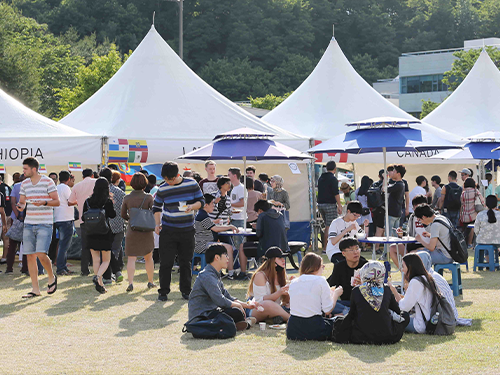 The 2017 International Food Festival
The savory smell of exotic dishes filled the main plaza of the KAIST campus on May 26. Exotic music reverberated throughout the campus. The KAIST community took a break together on a breezy early summer Friday afternoon sharing food with their friends and family. KAIST international student body, KISA (KAIST International Students Association), installed white food tents and prepared their country’s favorite dishes at their 13th annual International Food Festival.
The festival was co-organized with Chungnam National University and the University of Science & Technology (UST). At the festival, students from 18 nations cooked about 60 dishes and sold them to the public. Foreign students’ performances of traditional dance and music on the stage livened the atmosphere.
KISA President Sanzhar Kerimbek of the Department of Chemical and Biomolecular Engineering said, “We are so glad to show the diversity of KAIST and its rich culture. This is a big opportunity to get together with neighboring universities, CNU and UST and say thank you for their participation and support." Valentin Porcellini, an exchange students from France in the School of Computing, said, “We are so excited to have people taste our crepes, ratatouille, and other dishes.”
Associate Vice President of the International Office Jay Hyung Lee also said he was glad to see so many people joining this festival. While congratulating the students on the success of the festival, he said the festival will serve as an opportunity to better understand each other by sharing the food and culture.
(Photo caption: Paricipants stop by the Indonesian booth to purchase the food at the International Food Festival on May 26.)
2017.05.29 View 6687
The 2017 International Food Festival
The savory smell of exotic dishes filled the main plaza of the KAIST campus on May 26. Exotic music reverberated throughout the campus. The KAIST community took a break together on a breezy early summer Friday afternoon sharing food with their friends and family. KAIST international student body, KISA (KAIST International Students Association), installed white food tents and prepared their country’s favorite dishes at their 13th annual International Food Festival.
The festival was co-organized with Chungnam National University and the University of Science & Technology (UST). At the festival, students from 18 nations cooked about 60 dishes and sold them to the public. Foreign students’ performances of traditional dance and music on the stage livened the atmosphere.
KISA President Sanzhar Kerimbek of the Department of Chemical and Biomolecular Engineering said, “We are so glad to show the diversity of KAIST and its rich culture. This is a big opportunity to get together with neighboring universities, CNU and UST and say thank you for their participation and support." Valentin Porcellini, an exchange students from France in the School of Computing, said, “We are so excited to have people taste our crepes, ratatouille, and other dishes.”
Associate Vice President of the International Office Jay Hyung Lee also said he was glad to see so many people joining this festival. While congratulating the students on the success of the festival, he said the festival will serve as an opportunity to better understand each other by sharing the food and culture.
(Photo caption: Paricipants stop by the Indonesian booth to purchase the food at the International Food Festival on May 26.)
2017.05.29 View 6687 -
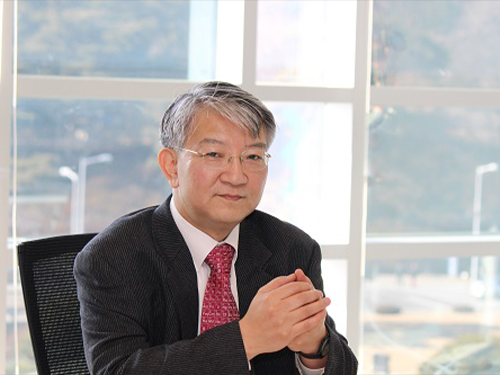 Distinguished Professor Lee Elected to the NAS
Distinguished Professor Sang Yup Lee of the Department of Chemical and Biomolecular Engineering was elected as a foreign associate to the US National Academy of Sciences (NAS) on May 2. The National Academy of Sciences elected 84 new members and 21 foreign associates in recognition of their distinguished and continuing achievements in their original research. Election to the Academy is widely regarded as one of the highest honors that a scientist can receive.
Professor Lee was also elected in 2010 as a member of the US National Academy of Engineering (NAE) for his leadership in microbial biotechnology and metabolic engineering, including the development of fermentation processes for biodegradable polymers and organic acids. Until 2016, there are only 12 people worldwide who are foreign associates of both NAS and NAE.
He is the first Korean elected to both prestigious academies, the NAS and the NAE in the US. Professor Lee is currently the dean of KAIST Institutes, the world leading institute for multi-and interdisciplinary research. He is also serving as co-chair of the Global Council on Biotechnology and member of the Global Future Council on the Fourth Industrial Revolution, the World Economic Forum.
2017.05.16 View 11146
Distinguished Professor Lee Elected to the NAS
Distinguished Professor Sang Yup Lee of the Department of Chemical and Biomolecular Engineering was elected as a foreign associate to the US National Academy of Sciences (NAS) on May 2. The National Academy of Sciences elected 84 new members and 21 foreign associates in recognition of their distinguished and continuing achievements in their original research. Election to the Academy is widely regarded as one of the highest honors that a scientist can receive.
Professor Lee was also elected in 2010 as a member of the US National Academy of Engineering (NAE) for his leadership in microbial biotechnology and metabolic engineering, including the development of fermentation processes for biodegradable polymers and organic acids. Until 2016, there are only 12 people worldwide who are foreign associates of both NAS and NAE.
He is the first Korean elected to both prestigious academies, the NAS and the NAE in the US. Professor Lee is currently the dean of KAIST Institutes, the world leading institute for multi-and interdisciplinary research. He is also serving as co-chair of the Global Council on Biotechnology and member of the Global Future Council on the Fourth Industrial Revolution, the World Economic Forum.
2017.05.16 View 11146 -
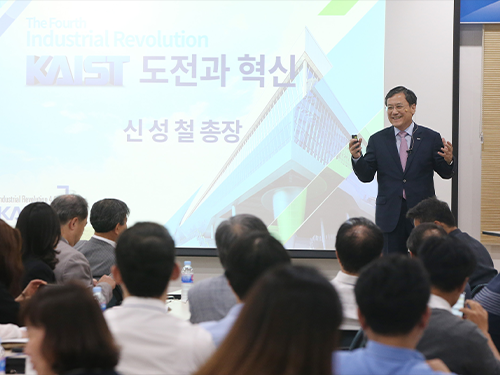 Policy Debate Series for Industry 4.0
(Photo caption: President Shin takes the podium as the first speaker of a year-long monthly policy dabate series on Industry 4.0 on May 11.)
KAIST will kick off a monthly policy debate series on Industry 4.0 every Thursday from May 11 at the Startup KAIST building. The year-long series, featuring professors from key technology fields associated with Industry 4.0, is designed to help policy makers from government, industry, and research institutes respond better to the ramifications that Industry 4.0 brings about in each sector.
The series will help them establish the vision and strategy that will work for the new industrial environment to take the lead in the new industrial era.
Twelve professors, including President Sung-Chul Shin, from departments that are researching emerging technologies will speak on the megatrend of new technology, while facilitating debates and Q& A sessions with participants.
The participants will include officials from the government complexes in Sejong and Daejeon cities, government-funded research institutes in Daejeon, and businessmen, among others. For registration, please go to https://startup.kaist.ac.kr/register.
Schedule
Speaker
Theme
May 11
President Sung-Chul Shin
Challenges and Innovations of KAIST in the Era of Industry 4.0
June 8
Professor Jonghwan Kim
Machine Intelligence and Deep Learning
July 6
Professor Jun Ho Oh
Robot Technology and the Future
Aug. 3
Professor Hyunchul Shim
Unmanned Vehicle Technology and Industry 4.0
Sept. 7
Professor Hawoong Jeong
Complex Systems and Data Science
Oct. 12
Professor Yongdae Kim
Technology, Policy, and the Fostering of Talents: Industry 4.0 and Information Protection
Nov. 9
Professor Sang Yup Lee
The Role of Biotechnology in Industry 4.0
Dec. 7
Professor Meeyoung Cha
AI-Based Research for Fake News Detection
2018 Jan. 4
Professor Joungho Kim
Innovation for the Korean Semiconductor Industry: Kim’s Law
Feb. 8
Professor Jaekyun Moon
Education for Industry 4.0
March 8
Professor Sang Kil Cha
Artificial Intelligence Cyber Warfare: Its Present and Future
April 5
Professor Jaeseung Jeong
The Future of Brain Engineering and Artificial Intelligence
2017.05.08 View 11811
Policy Debate Series for Industry 4.0
(Photo caption: President Shin takes the podium as the first speaker of a year-long monthly policy dabate series on Industry 4.0 on May 11.)
KAIST will kick off a monthly policy debate series on Industry 4.0 every Thursday from May 11 at the Startup KAIST building. The year-long series, featuring professors from key technology fields associated with Industry 4.0, is designed to help policy makers from government, industry, and research institutes respond better to the ramifications that Industry 4.0 brings about in each sector.
The series will help them establish the vision and strategy that will work for the new industrial environment to take the lead in the new industrial era.
Twelve professors, including President Sung-Chul Shin, from departments that are researching emerging technologies will speak on the megatrend of new technology, while facilitating debates and Q& A sessions with participants.
The participants will include officials from the government complexes in Sejong and Daejeon cities, government-funded research institutes in Daejeon, and businessmen, among others. For registration, please go to https://startup.kaist.ac.kr/register.
Schedule
Speaker
Theme
May 11
President Sung-Chul Shin
Challenges and Innovations of KAIST in the Era of Industry 4.0
June 8
Professor Jonghwan Kim
Machine Intelligence and Deep Learning
July 6
Professor Jun Ho Oh
Robot Technology and the Future
Aug. 3
Professor Hyunchul Shim
Unmanned Vehicle Technology and Industry 4.0
Sept. 7
Professor Hawoong Jeong
Complex Systems and Data Science
Oct. 12
Professor Yongdae Kim
Technology, Policy, and the Fostering of Talents: Industry 4.0 and Information Protection
Nov. 9
Professor Sang Yup Lee
The Role of Biotechnology in Industry 4.0
Dec. 7
Professor Meeyoung Cha
AI-Based Research for Fake News Detection
2018 Jan. 4
Professor Joungho Kim
Innovation for the Korean Semiconductor Industry: Kim’s Law
Feb. 8
Professor Jaekyun Moon
Education for Industry 4.0
March 8
Professor Sang Kil Cha
Artificial Intelligence Cyber Warfare: Its Present and Future
April 5
Professor Jaeseung Jeong
The Future of Brain Engineering and Artificial Intelligence
2017.05.08 View 11811 -
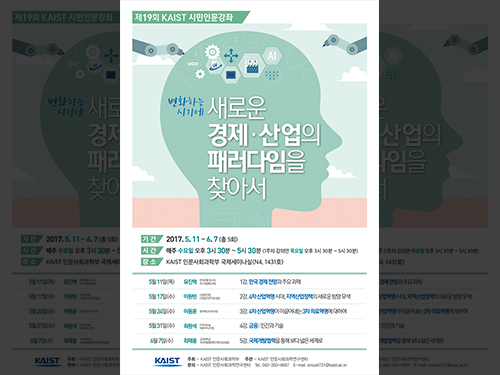 Seeking a New Economic and Industrial Paradigm
The School of Humanities & Social Science will offer the open lecture course titled ‘Seeking a New Economic and Industrial Paradigm’ from May11 to June 7. This is part of a quarterly lecture series run by the school and open to the public.
The open lecture is designed to provide opportunities for the public to identify future challenges and opportunities for Korea’s economy and industry. Experts in macroeconomics, finance, and global collaboration will provide glimpses of new directions for each sector as well as megatrends of emerging technologies on the heels of the 4th Industrial Revolution.
Jin Hyuk Yoo from the Bank of Korea will speak on the ‘Outlook and Challenges of the Korean Economy.’ He will identify the current economic situation and explain how to build on sustainable long-term economic growth in the opening course.
Won-Bin Lee of the Korea Institute for Industrial Economics & Trade will present on the ‘New Industrial Policy in the Era of the Fourth Industrial Revolution.’ His lecture will focus on fostering the local industry and creating its own ecosystem for furthering regional industries.
Dong-Hoon Lee of Donga ST will speak on the implications that the Fourth Industrial Revolution will bring about in the medical industry. Won-Suk Choi of FnPricing will introduce the FN business model, presenting the risks and benefits of fintech in his lecture ‘Finance: Human and Technology.’
Jae-Hong Choi of the Institute of International Development Cooperation at Korea University will give a talk titled ‘Toward the World through Global Cooperation.’ He will present on the history of Korea’s global cooperation initiatives and the role of KOICA, introducing its emerging economic and industrial cooperation model.
Professor Jeounghoon Kim, who is responsible for the public lecture program, said, “Korea now faces very diverse social economic and industrial challenges and we seem to be lost while searching for a solution. The public will have an opportunity to understand the current economic situation and its industrial implications.”
For registration and more info, please visit http://hss.kaist.ac.kr.
2017.04.26 View 9544
Seeking a New Economic and Industrial Paradigm
The School of Humanities & Social Science will offer the open lecture course titled ‘Seeking a New Economic and Industrial Paradigm’ from May11 to June 7. This is part of a quarterly lecture series run by the school and open to the public.
The open lecture is designed to provide opportunities for the public to identify future challenges and opportunities for Korea’s economy and industry. Experts in macroeconomics, finance, and global collaboration will provide glimpses of new directions for each sector as well as megatrends of emerging technologies on the heels of the 4th Industrial Revolution.
Jin Hyuk Yoo from the Bank of Korea will speak on the ‘Outlook and Challenges of the Korean Economy.’ He will identify the current economic situation and explain how to build on sustainable long-term economic growth in the opening course.
Won-Bin Lee of the Korea Institute for Industrial Economics & Trade will present on the ‘New Industrial Policy in the Era of the Fourth Industrial Revolution.’ His lecture will focus on fostering the local industry and creating its own ecosystem for furthering regional industries.
Dong-Hoon Lee of Donga ST will speak on the implications that the Fourth Industrial Revolution will bring about in the medical industry. Won-Suk Choi of FnPricing will introduce the FN business model, presenting the risks and benefits of fintech in his lecture ‘Finance: Human and Technology.’
Jae-Hong Choi of the Institute of International Development Cooperation at Korea University will give a talk titled ‘Toward the World through Global Cooperation.’ He will present on the history of Korea’s global cooperation initiatives and the role of KOICA, introducing its emerging economic and industrial cooperation model.
Professor Jeounghoon Kim, who is responsible for the public lecture program, said, “Korea now faces very diverse social economic and industrial challenges and we seem to be lost while searching for a solution. The public will have an opportunity to understand the current economic situation and its industrial implications.”
For registration and more info, please visit http://hss.kaist.ac.kr.
2017.04.26 View 9544 -
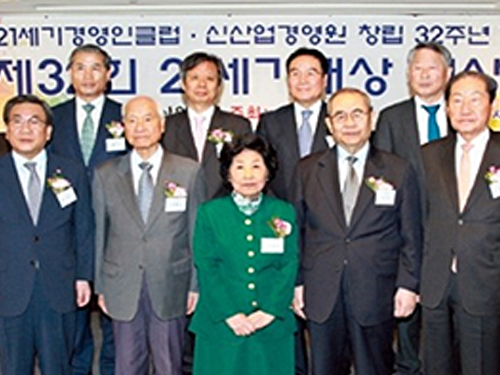 Professor Duck-Joo Lee Awarded the 21st Century Grand Prize
Professor Duck-Joo Lee of the Department of Aerospace Engineering was awarded the 21st Century Grand Prize in the field of technology development by the New Industry Management Academy and the 21st Leaders Club on April 13.
Professor Lee was honored in recognition of his contribution to the helicopter industry. He played a part in domestic helicopter development projects including the KUH-1 Surion (Korean Attack Helicopter), a twin-engine, transport utility helicopter as well as LAH (Light Armed Helicopter) and LCH (Light Civil Helicopter) projects.
Since joining KAIST in 1988, Professor Lee supervised more than 26 PhDs and 27 MSs. He was responsible for hosting the 1st Asian-Australian Rotorcraft Forum and Exhibition and currently serves as vice president of the American Helicopter Society and the Korea Drone Industry Promotion Association. He also participated in open online courses on K-MOOC and Coursera.
(Caption: Professor Lee (second from left in the first row) poses after receiving the award.)
2017.04.26 View 9006
Professor Duck-Joo Lee Awarded the 21st Century Grand Prize
Professor Duck-Joo Lee of the Department of Aerospace Engineering was awarded the 21st Century Grand Prize in the field of technology development by the New Industry Management Academy and the 21st Leaders Club on April 13.
Professor Lee was honored in recognition of his contribution to the helicopter industry. He played a part in domestic helicopter development projects including the KUH-1 Surion (Korean Attack Helicopter), a twin-engine, transport utility helicopter as well as LAH (Light Armed Helicopter) and LCH (Light Civil Helicopter) projects.
Since joining KAIST in 1988, Professor Lee supervised more than 26 PhDs and 27 MSs. He was responsible for hosting the 1st Asian-Australian Rotorcraft Forum and Exhibition and currently serves as vice president of the American Helicopter Society and the Korea Drone Industry Promotion Association. He also participated in open online courses on K-MOOC and Coursera.
(Caption: Professor Lee (second from left in the first row) poses after receiving the award.)
2017.04.26 View 9006